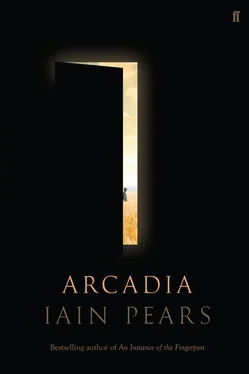That was not good. They would knock, Henry would answer, they would find the Devil’s Handwriting and think it was some code for communicating with the Soviet Union. Sam Wind always had a limited imagination. I would not be able to destroy it. It was required to survive. Or rather, probability dictated it was more likely to than not.
I could hardly hang around to argue about it; I didn’t intend to go back to jail merely for the satisfaction of demonstrating that history cannot be greatly influenced by the actions of a single individual. I still wanted to prove that wrong. There wasn’t much I could do for Henry, but at least I might be able to save myself.
I tiptoed down the servants’ staircase at the far end of the corridor, down into the bowels of the old kitchens, and, when I was satisfied that Henry had unleashed the full conversational power of Aunt Gertie on them, slipped quietly out of the tradesmen’s entrance and across the grass to the nearest trees, then circled round to the road where we had left the car. I drove to Hereford, left it in a side street and took the train back to Oxford.
The cars that arrived while Lytten was waiting for Angela to come back down were very quiet, he had to admit. When the doorbell rang he was sitting, unsuspecting, across from his aunt, concentrating hard to make some sense of her increasingly bizarre conversation. Perhaps that was why he had not been as alert as usual. Once upon a time he would never have been caught out so easily.
He looked out of the window. A little posse led by Sam Wind was already at the door, grim and determined. Not much to be done; he was far too old for gymnastics and anyway his mind was on other things. One by one they filed through, but Lytten was already walking silently back to the sitting room.
‘Our dinner guests!’ screeched Aunt Gertie. ‘They’re early!’
Sam ignored her. ‘I’m afraid it’s all over, Henry,’ he said.
‘It is, I fear. I’m disappointed in you, Sam, coming all this way when you have better things to do.’
‘What did you come here for?’
Lytten took the thin volume from his pocket. ‘You won’t find it very illuminating.’
Sam looked at it. ‘What the hell is this?’
‘Ah, now. I suppose you will decide it is some abstruse code. It isn’t. At least, not the variety you want it to be.’
‘When did you become a Soviet agent, Henry? During the war, or was it before that?’
‘What a lazy idea,’ Lytten said mildly. ‘I’m quite offended.’
‘Years of leaks and betrayals. You were untouchable, Portmore’s golden boy throughout the war. No one ever thought of you, you were so protected by his aura. Age, my friend. You should have given up years ago.’
‘You are probably right there,’ Lytten said.
‘The final proof was that man who showed up, and the attack on Volkov.’
‘I see you have been thinking hard. Are you planning to whisk me off somewhere?’
‘Yes.’
‘Then before we leave, Sam Wind, I would like a word in private, if you don’t mind. It won’t take long.’
Wind looked suspicious, then nodded.
‘I think the study still has some glass in the panes. If your friend would stay here...’
Lytten led Wind out of the doors and across the entrance hall. ‘Poor fellow. Half an hour of Gertie and he’ll be the one who goes over to Moscow.’
The room was dark, cold and dusty. It had been his great-uncle’s once, and Lytten thought he could just make out the last whiffs of the pipe tobacco the man had smoked, a peculiar concoction, cherry-flavoured Cavendish, that he had blended specially for him in a tobacconist’s on Holborn. Lytten stood by the fireplace — why he wasn’t certain, as it had not been lit for years. It was where his great-uncle had liked to denounce the iniquities of the unions, or the socialists, or the Germans, or anyone who had recently incurred his wrath.
‘Right then. Sit down and listen, if you will. It won’t take long, and then you can take such action as you please. You believe I have incriminated myself. You decide to take Volkov away, so I immediately summon aid from the Soviet embassy, which organises a rapid assassination attempt. Or maybe it was Chang. Rather peculiar behaviour, don’t you think? I may be getting addled, but I am not so far gone that I could not have killed Volkov myself the moment I saw him in Paris.’
‘Volkov is in hospital with a bullet in him.’
‘So you tell me. How is the poor fellow?’
‘He will survive. He was damned lucky.’
‘Good, good.’ Lytten paused for a moment to reflect. ‘That makes it all much easier. Although it is going to be very difficult to explain to him.’
‘I’m sure he understands all too well.’
‘I’m sure he doesn’t. It’s not what he signed up for.’
‘What does that mean?’
‘His name is David Kupransky. A part-time lecturer in Russian literature. Always a bit short of cash since his wife left him. She had the money, you see. A great pity, but she found his extravagant White Russian ways a little too much after a while...’
‘Henry!’
‘Hmm? Oh. Yes. I offered him a little money to take part in some amateur theatricals. I wrote the note, sent it to myself via Portmore, and packed him off to Paris, just to see what would happen when he said he could identify a traitor in the service. He was very convincing, I must say, although he hammed it up rather. The point is, I would hardly go to such lengths to shoot a colleague. Common-room politics can get nasty on occasion, but rarely that bad.’
‘You can prove this?’
‘Of course I can. Very easily. Even if he dies, his wife will be able to identify him.’
‘So what about Volkov? The real one? Was there a real one?’
Lytten shrugged. ‘I knew someone of that name in Berlin, but I’ve not heard anything of him since. He might have been shot, for all I know.’
‘All of this was a trick? Why?’
‘To catch you. Portmore’s orders. Or rather, not to catch you.’
Sam Wind tried to take up a pose of knowing lack of concern, and Lytten leant against the mantelpiece and wished he had a pipe.
‘I have gone through everyone over the last two years, Sam. Portmore was convinced there was a traitor and told me to find him before he retired. I didn’t want to, but you know how persuasive he is. So I did as he asked, ticking you all off my list, one by one. Slogged through the papers, the old reports. I laid little traps to see who responded. Nothing. Two years of work, and nothing. Not even the suggestion of a bite.
‘So I was down to you. Everyone else could be cleared. You were the last. Poor old Portmore was getting very agitated by this stage, or as agitated as he ever gets, and I felt sure I was close to finding out. You were the only person I hadn’t checked on.
‘Then it occurred to me that I should be thorough. There was a huge gaping hole in my investigation; one other person I’d left out. So I decided to do both at the same time.’
‘Who was that?’
‘Portmore himself,’ Lytten said. ‘I could see a trial where some defence counsel tried to get you off by besmirching his reputation, making innuendos and asking why he hadn’t been subject to the same investigation as everyone else. So I gave some information about Volkov to you, some to Portmore.
‘I told him I was going to Paris, but I didn’t tell you, and I was followed. I told you, but not Portmore, when Volkov was coming to Oxford, and that man Chang showed up.
‘So it was even. Either of you could be the one. Except that Mr Chang, my watcher, was a nobody. He’s reappeared, by the way, and you can talk to him yourself. The point is, he is completely harmless and was only interested in that manuscript you just took off me. I came to fetch it as I felt somewhat guilty about him getting an arrow in his backside.’
Читать дальше












